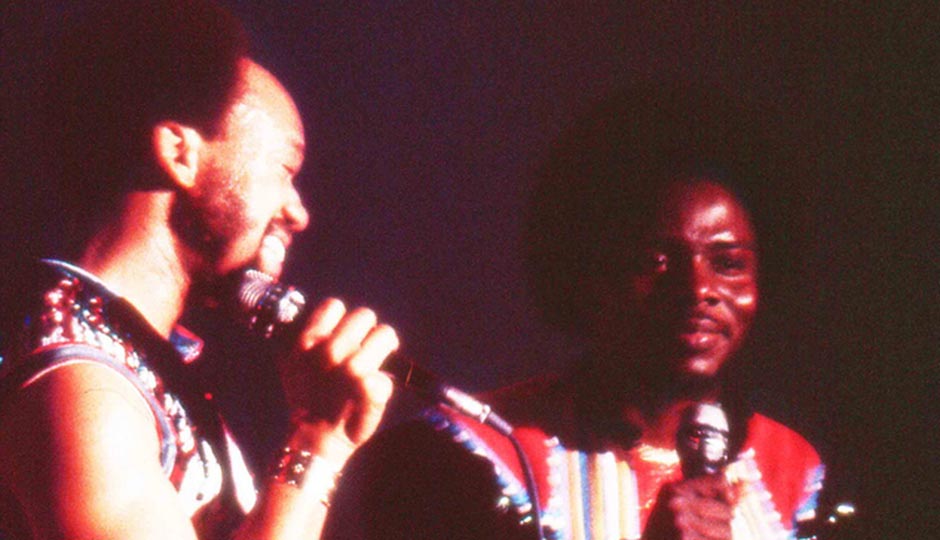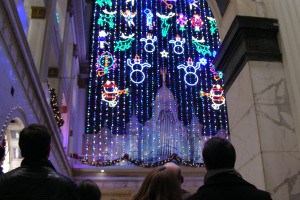Why Earth, Wind & Fire Was Huge in Philadelphia

Earth, Wind & Fire’s Maurice White (left) and Philip Bailey performing in 1982 at the Ahoy Rotterdam, The Netherlands. White died on February 4th. Photo | Chris Hakkens, CC BY-SA 2.0.
At school, I casually mentioned to my classmates I was heading to the EWF concert, and I suddenly became an ultra cool kid. By the time I joined the capacity crowd at the venerable Spectrum, I knew I was in for a concert experience the would go down in the annals of great concerts. The show kicked off when the booming voice of the emcee took to the public address to announce — “Presenting the elements of the universe: Earth! Wind! And Fire!” The incendiary band hit the stage and by incorporating the skills of illusionist Doug Henning and fantastical outfits, EWF dazzled their faithful attendees with a sophisticated mix of funk, jazz, Africana and soul.
“The first time I went to an Earth, Wind & fire concert was when they came to the Spectrum in 1977 with The Emotions,” recalls Philadelphia-based professional musician Rhonda Lancaster. “I was hoarse for three days. I screamed the whole concert.”
Today, the longtime Germantown resident is considered a colleague by EWF members (Maurice White’s brother and original EWF member Verdine White is her friend), and Lancaster credits the group for helping her formulate her career path. “They have had so much of an influence, not only in my music career, but in the messages that Maurice put out in the world. The music and message was conceptional, heavy, and some of those messages still apply today. It is amazing that 40 years ago, when he put those messages out that those things still reflect how times really have not changed. Maurice has had a big influence.”
In reality, White was a minister of sorts, and Earth, Wind & Fire (named after the three elements in his astrological chart) were part of his musical ministry with a sustained message of peace, spirituality, African consciousness, freeform mysticism and, of course, love. Not only did White incorporate intricate music patterns and sophisticated lyrical play, he harnessed the sounds the African thumb piano called a kalimba and made it a staple of the EWF sound. White even named his production company Kalimba Productions. “The kalimba represented my link to Africa,” White explained in an earlier interview. “It was my way of taking part of that culture and spreading it all over the world.”
Lancaster adds: “I don’t know any musician out of any genre that has covered African music, Latin music, Caribbean music. If you listen carefully you will hear a lot of harmonies that came from Eastern cultures. Maurice brought the kalimba to the forefront, something that in America we didn’t know anything about.”
White himself was a musical melting pot. He was born into the down-home gospel groove of Memphis, and relocated as a teen to study at the Chicago Conservatory of Music. By 1966, he joined the Ramsey Lewis Trio as a drummer. By 1969, White had launched out on his own, forming an early version of the band that would become EWF. In Los Angeles, White was commissioned by radical Black filmmaker Melvin Van Peebles to provide the soundtrack to the low-budget film, Sweet Sweetback’s Baadasssss Song. Both the album and the movie became an underground hit, making EWF musical architects of the Blaxploitation era, thus paving the way for Isaac Hayes’ Shaft and Curtis Mayfield‘s Superfly.
Film projects proved to be the foundation of White’s nascent success with Earth, Wind & Fire. That’s the Way of the World is the soundtrack to a 1975 film of the same name. The movie flopped (in fact, it remained unseen by the public for decades until its 2006 DVD release), while the triple platinum album was one of the best sellers of 1975. White clearly had his finger on the pulse of pop sensibilities, while at the same time shoehorning African heritage into the American dichotomy. Whether listeners understood what they were hearing, they were most certainly intrigued by the spiritual missives in the lyrics and the intricately designed album covers that displayed Egyptian pyramids and Biblical signs. Ultimately, White honed a message that connected Black Americans with their ancestors and cultural cousins throughout the world.
Vocalist Philip Bailey joined EWF’s second lineup in 1972, three years after the band’s inception in Chicago. As White guided Bailey and the band along on a wild musical ride of mysticism, magic and high spirituality, it was Bailey’s vocal prowess that help push the band from experimental obscurity to mainstream explosion. I spoke with the eight-time Grammy winner in 2014, prior to his performance at Mother Bethel AME Church in Society Hill to promote his book Shining Star: Braving the Elements of Earth, Wind & Fire.
According to Bailey, the group’s music is an extension “of the way we were raised, and the times that we were living in. There was such a need for whoever had a voice of any significance to use it for the betterment of humanity. Even, when you mention Sly Stone, who we were very inspired by, listen to them and the message in his music and in his songs. We were just picking up where he was in certain respects — as were many artists of that day. I guess it was in vogue at that point and in those days from Donnie Hathaway, to folk music from Joni Mitchell, whom I was a big fan of. There were a lot of messages in the music, and people didn’t mind that. It was inspiring.”
During their peak years, Earth, Wind & Fire employed 10 musicians that featured the famed Phenix Horns section that Rolling Stone magazine once declared “changed the sound of Black pop.” Trumpeter Henri McMillian has recorded and performed with such musical legends as Boyz II Men, Patti Labelle, Teddy Pendergrass and The Stylistics, and was also the musical director for Harold Melvin and the Blue Notes for several years. Today, he heads up the Philly-based funk band, Urban Guerilla Orchestra (UGO). “Oh my goodness! Earth, Wind & Fire is probably the biggest single influence on my life as a musician,” notes McMillian. “Tower of Power may be a close second, but certainly Earth, Wind & Fire is number one. It is kinda crazy because it cuts deep for me. There are a number of musicians who are in mourning right now because at the time that that music was going on, that basically was our Rolling Stones, Elton John, Billy Joel — it was our perspective to be able to see people who looked like us on a grand scale. Outside of that, you had the Jackson Five, but for a band perspective Earth, Wind & Fire was it. And, you look at the legacy of what was set, White was a genius all the way around.”
Likewise, record producer and tour musician Darnell Robinson credits White and EWF with shaping the character of the regional music scene. Prior to relocating to California, the Philly native performed with a number of local R&B groups including Mission, The Stylistics and countless recording artists. “Because I am a saxophonist and flute player, I grew up listening to horn bands,” recalled Robinson. “I’ve worked with bands since I was 14-years-old, and I listened to bands like Earth, Wind & Fire and everything that was hot that had horns. I once worked with a group called Earthbound in Philadelphia with a horn section that would be anywhere from four to 15 horns. We just loved all the Earth, Wind & Fire songs because we were a group that could emulate, almost to perfection, their sound and the things that they were doing. They heavily influenced our playing and really our dynamic as playing and having a strong horn section.”
As a teen, Robinson was invited to shared the stage with EWF when the Stylistics performed at London’s Wembley Stadium. “We met Maurice White and hung out and had a good time. It’s a memory and it’s a heavy loss to see that someone that influenced the music industry in such a big and profound way has passed away.”
White has also been cited as a main influence by Philadelphia soul singers such as Bilal, Musiq Soulchild and others, including event deejay Aaron Scott, aka DJ 2Eleven. “I was born in 1979, and I actually would listen to the music that my mom and my dad would play,” said Scott. “I would hear different songs and just the architecture of the horns and the way they did their drums. They definitely are icons. I have worked on a project with a couple of guys doing some hip-hop things and they were sampling Earth, Wind & Fire songs. As far a deejaying, one of the best songs as far as getting the people at the cabarets and different things going is ‘September.’”
While White was always at the center of all EWF projects, he was a noted producer who was quietly behind the scenes perfecting the sounds of others. One example is the criminally overlooked smooth jazz all-star collective Urban Knights. The supergroup’s self-titled 1995 debut included Ramsey Lewis, Najee and Grover Washington, Jr., with White serving as executive producer.
White also worked directly with several other Philly artists, including bassist Cedric A. Napoleon, founding member of the iconic jazz group Pieces of a Dream. For their fourth album, Joyride, White served as a producer and percussionist. The 1984 album reached No. 3 on the Billboard Top Jazz Albums chart. Napoleon recalled that he spent six months in Los Angeles with White, who occasionally allowed the then-Temple University student to tool around town in his 928 Porsche. “Just being in his presence was a gift to me,” said Napoleon. “Seeing him work, seeing him pull some stuff out of us at a young age — we were 22. And, even before that: Earth, Wind & Fire was the first big live group I’d ever seen. I was 13, and my friend up the street, his dad took us to the Spectrum to see Earth, Wind & Fire. I remember ‘Getaway’ was the new song. I remember seeing his spirit cover the room. I was in awe of him. He blew me away …”
And suddenly, another memory took hold of the conversation. “I lost my virginity to an Earth, Wind & Fire song: ‘Love’s Holiday’. I tell you today when I hear that song I get chills and shit.”
Napoleon, himself a noted vocalist, then launched into the song: “Would you mind if I touch/if I kiss, if I held you tight/in the morning light/Would you mind if I said how I felt tenderly tonight/ again cause/I never ever felt this way in my heart before/Love has a holiday in my heart tonight/ Would you mind if I looked/ into your eyes till I’m hypnotized/ and I lose my pride…”
“I tell you, man… Oh, my God,” says Napoleon as he concludes his impromptu concert.
“It was the vibe. Maurice always told me, ‘You gotta feel each other; nothing is good without feeling each other.’ We were as one, we were tight anyway, but Maurice just made us tighter about not only feeling the music, but feeling each other feeling the music.”
In an interview with The Associated Press in 2000, White said he wanted the band’s music to inspire instead of just entertain. “That was the whole objective, to try to inspire young people to believe in themselves and to follow through on their ideas,” he said. “We’ve touched so many people with these songs.”
According to the ancient beliefs, the elements of the universe represent movement, change and development and are changing, moving, waning and expanding all the time. White — who died on February 4th at age 74 — was the consummate audio architect who taught all who he touched to embrace the known and unknown compounds of our world, while feeling, enjoying and absorbing the lessons contained in the music of Earth, Wind & Fire.
Follow @bobbibooker on Twitter.


